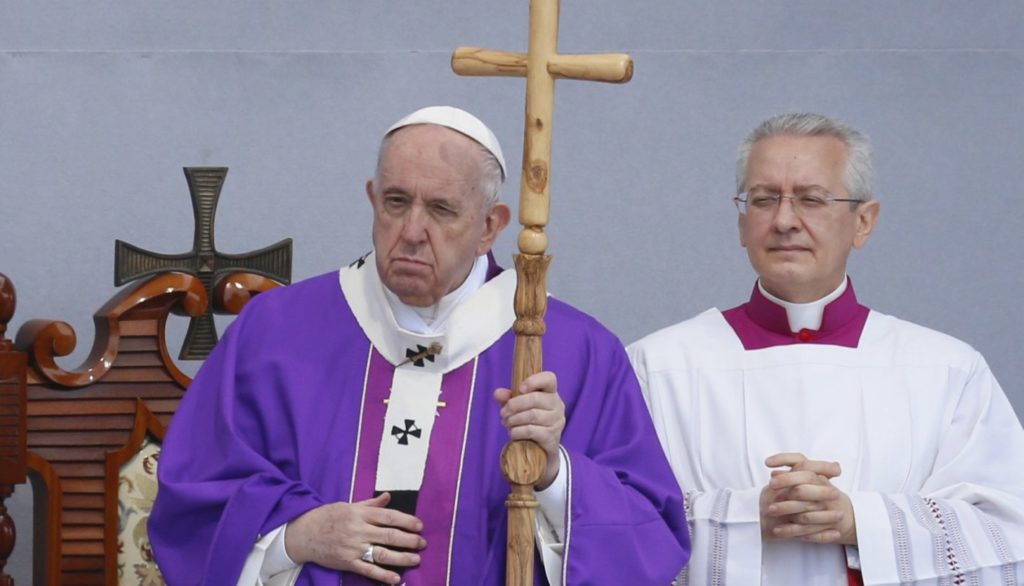On the second day of his trip to Malta, Pope Francis traveled to the city of Rabat to visit the Grotto of St. Paul, where the apostle is believed to have lived and preached for three months after being shipwrecked on his way to Rome.
In the grotto of St. Paul
The pontiff entered the basilica at the top of the grotto before descending into the grotto itself, which was also visited by Pope Emeritus Benedict XIV and St. John Paul II. The Pope lit a candle in front of the statue of the Apostle Paul and prayed that the spirit of welcome that the islanders had for the saint may continue for the migrants arriving on the shores of the island.
After saying the prayer, he wrote in the Book of Honor: "In this sacred place, which commemorates St. Paul, Apostle of the Gentiles and father in the faith of this people, I thank the Lord and ask him to always grant the Maltese people the Spirit of consolation and the ardor of proclamation".
Holy Mass in Floriana
The Pope then travelled to the city of Floriana, Malta, to celebrate Holy Mass. Some 20,000 people were present at the celebration, including representatives of the Christian Churches and other religious denominations. The Granary Square in Floriana is located outside the walls of Valletta, the capital of Malta, and overlooks the Church of St. Publius, considered the first bishop of Malta and who, according to tradition, welcomed the Apostle Paul to the island after he was shipwrecked.
Commenting in his homily on the behavior of the characters in today's Gospel passage, Pope Francis recalled that "these characters tell us that even in our religiosity the worm of hypocrisy and the vice of finger-pointing can creep in. In every age, in every community. There is always the danger of misunderstanding Jesus, of having his name on our lips but denying him in fact. And this can also be done by raising banners with the cross. How can we then verify if we are disciples in the school of the Master? By our look, by how we look at our neighbor and how we look at ourselves. This is the point to define our belonging".
A look of mercy
The Holy Father indicated that the Christian's gaze must be that of Jesus Christ, "a gaze of mercy," not that of accusers, "in a judgmental, sometimes even contemptuous way," "who set themselves up as champions of God but do not realize that they are trampling their brothers and sisters underfoot." Franciso recalled that, "in reality, those who believe they defend the faith by pointing the finger at others may have a religious vision, but they do not embrace the spirit of the Gospel, because they forget mercy, which is the heart of God."
Francis gave another key, - in addition to our gaze towards others - to "understand if we are true disciples of the Master": how we see ourselves. "The woman's accusers are convinced that they have nothing to learn. Indeed, their external apparatus is perfect, but the truth of the heart is missing. They are the portrait of those believers who, in every age, make of faith a façade, where what stands out is the solemn exterior, but inner poverty, which is man's most precious treasure, is lacking. In fact, for Jesus what counts is the voluntary openness of those who do not feel that they have arrived, but are in need of salvation. Therefore, when we are in prayer and also when we participate in beautiful religious services, we should ask ourselves if we are in tune with the Lord".
"Jesus, what do you want from me?"
"We can ask Him directly: 'Jesus, I am here with You, but what do You want from me? What do You want to change in my heart, in my life? How do You want me to see others?' It will do us good to pray like this, because the Master is not content with appearances, but seeks the truth of the heart. And when we truly open our hearts to him, he can work wonders in us."
At the end of the homily, the Pope encouraged us to imitate Jesus Christ in this way, and assured us that "if we imitate him, we will not be forced to concentrate on denouncing sins, but to seek out sinners with love. We will not count the number of those present, but we will go in search of those absent. We will no longer point fingers, but begin to listen. We will not discard the despised, but we will look first to those who are considered last. This, brothers and sisters, Jesus teaches us today by his example".
"Let us allow ourselves to be surprised by him and welcome his newness with joy," Francis concluded.









